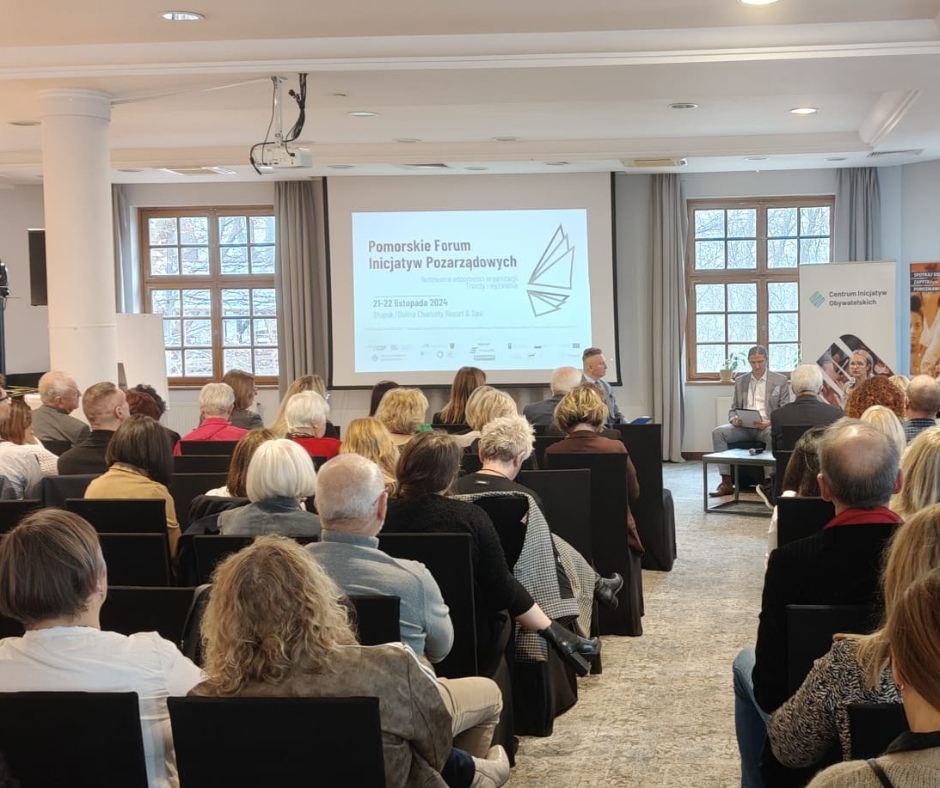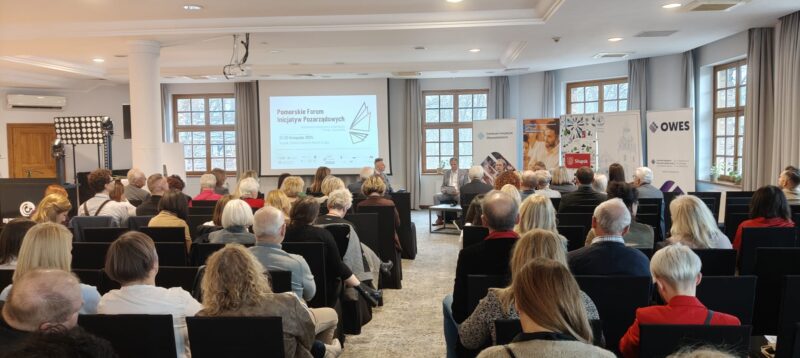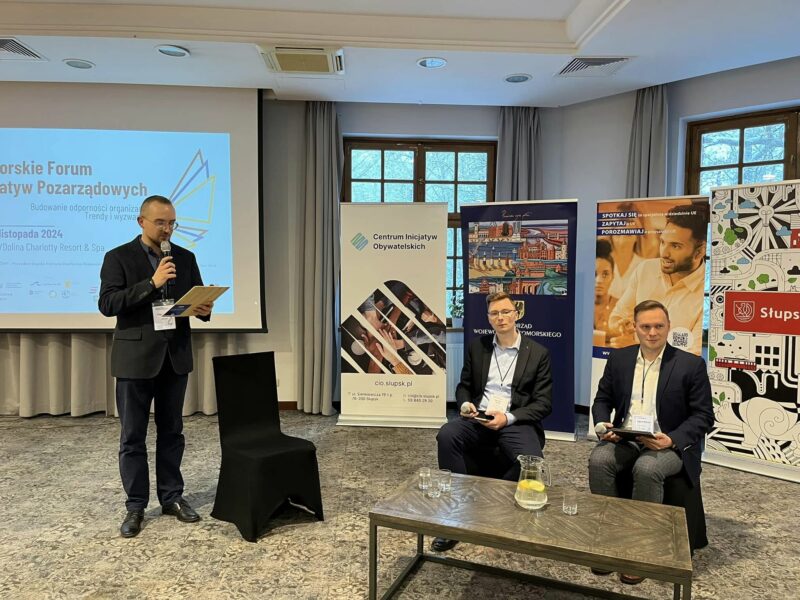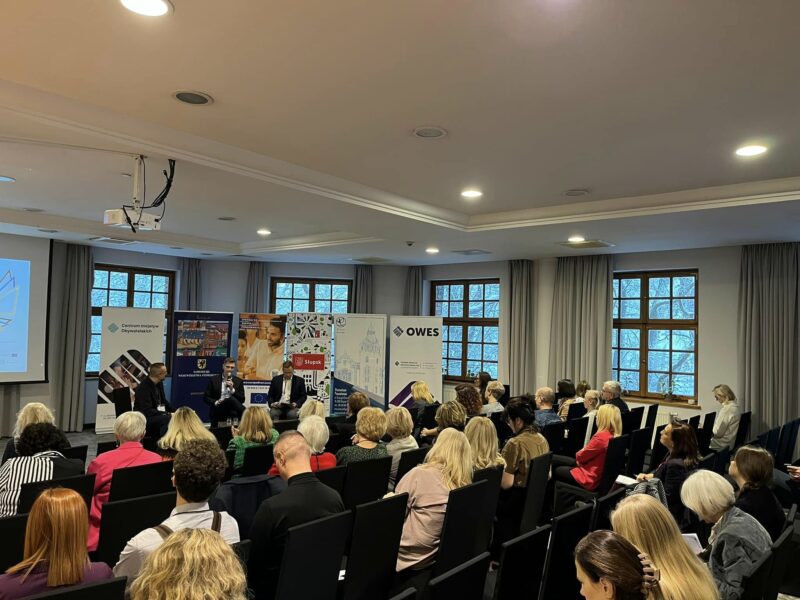On 21-22 November at Dolina Charlotty Resort & Spa in Strzelin near Slupsk, another conference of third sector representatives took place as part of the Pomeranian Forum for Non-Governmental Initiatives (PFIP). This year’s event was held under the theme: ‘Building the resilience of organisations. Trends and challenges’ and brought together NGO leaders, administration representatives, experts and representatives of the NGO sector from across the region.
It is the most important and oldest event in Pomerania focused on the topic of social activities implemented with the involvement of the three sectors. It is organised by the Pomeranian Network of NGO Centres, the Centre for Civil Initiatives and the Pomeranian Council of Non-Governmental Organisations. The event was held under the honorary patronage of the Mayor of Słupsk Krystyna Danilecka and the Marshal of Pomorskie Voivodeship Mieczysław Struk. The Centre for Sustainable Development was a partner of the event.
The programme, consisting of panels and workshops, brought closer the issue of civic education, proposed changes in the Act on Public Benefit Activity and Volunteerism, and the use of the potential of artificial intelligence in NGOs.
“Cooperation with NGOs is the foundation for the development of the social economy,” says Maciej Kochanowski, manager of the Analysis and Development Department at the Regional Centre for Social Policy. “NGOs are in the vast majority social economy entities, which is why it is so important to develop cooperation with them based on dialogue and joint creation of solutions. The key objective of this cooperation is to economise NGOs, i.e. to support them in building financial independence through the development of economic activity, thus strengthening their autonomy from public funds. As the Regional Centre for Social Policy, we not only coordinate these activities, but also listen to the voices of the organisations themselves.”
As Łukasz Samborski, Director of the RC Foundation, points out, making organisations and their activities more resilient to crises and stable are key challenges facing NGOs.
“Without stable funding, stable staff and a developed strategy, it will be very difficult for NGOs to develop, but also to survive,” emphasises the director. “During this year’s edition of the Pomeranian Forum for Non-Governmental Initiatives, it was clear how important networking is. The corridors were buzzing with talks, networking and joint ideas. Particularly widely commented on in the corridors was the theme from the workshop on the development of artificial intelligence and its impact on the activities of organisations.”
The Centre for Sustainable Development of the UG was represented at the Conference by Bartosz Duraj, coordinator of the Cooperation with the Social Environment programme at CZRUG, who took part in the panel ‘Artificial Intelligence in the Service of NGOs’. Together with Filip Jędruch, a journalist from Radio Gdańsk leading the panel, and Marcin Gołąbek, a project manager from the Hello Octopus agency, they discussed the potential that lies in the use of AI by organisations.
“Artificial intelligence will revolutionise the activities of NGOs,” comments Bartosz Duraj. “Thanks to this technology, tasks such as handling correspondence or preparing reports can be done automatically, allowing employees and volunteers to focus on what really matters, i.e. fulfilling the organisation’s mission.”
As the CZRUG colleague emphasises, artificial intelligence is a powerful solution, however, organisations should use it responsibly in order to fully exploit its potential. “As the Centre for Sustainable Development, we recognise the tremendous opportunities presented by collaboration in the use of artificial intelligence. Together with NGOs and academia, we can develop innovative solutions to achieve their goals and missions even more effectively, ” he adds.
Łukasz Samborski notes that the local government of the Pomeranian Voivodeship is increasingly supporting the development of volunteering in the region and recognises initiatives in smaller communities. “It can also be seen to be animating cooperation between counties and regions through, among other things, competition entries, but also educational activities in this area. The role of NGOs in Pomerania is still too small. We are not treated as partners, more often as simply a contractor. This situation is slowly changing, but still too slowly. We also lack strong bodies for dialogue in local government, such as NGO councils and public benefit activity councils – which by definition are supposed to look after the interests of the third sector, but also seek partnership treatment.”
PFIP 2024 was not only an opportunity to gain knowledge and exchange experience, but also a space for building cross-sectoral relationships, which are the foundation of NGO resilience.
“Our existing direct relationships are gradually moving into the digital sphere,” explains Tomasz Keler, president of the Pomeranian COP Network. “We are wondering to what extent this digitalisation will be beneficial for all parties involved and when there might be a risk that our audiences will start to feel the negative effects of these changes. We need to be prepared for the dynamic changes that are taking place in our environment. One of the biggest challenges for NGOs is adapting to changing legislation. Legal regulations affect every aspect of our activities, from working with volunteers to implementing community projects. We are closely following the work on the amendment of the Act on Public Benefit Activity and Volunteerism.”
The Pomeranian Forum for Non-Governmental Initiatives 2024 once again confirmed how important it is to strengthen intersectoral dialogue and support the development of non-governmental organisations. This year’s edition, in addition to substantive panels and workshops, was a space for building relationships and exchanging experiences that can contribute to greater resilience in the NGO sector. Discussions on digitalisation, financial sustainability and new legal regulations showed that organisations need to constantly adapt to dynamic changes and that their development requires not only commitment but also support from administration and institutional partners.
Photo gallery from the event: PFIP 2024





